Matthew Yglesias's Blog, page 2410
February 24, 2011
Civil War in Libya
The events in Libya are moving well outside the realm where I can say much about them that adds value, but I did want to encourage readers to note that there's more to life than domestic American political wrangling. In contrast to the "people power" scenarios that we've gotten used to seeing recently, the country seems to have taken a plunge into real civil war with large swathes of the official security forces waging war against the regime, which in turn has imported large quantities of mercenaries to fight back. It's also worth noting that, as ever, Silvio Berlusconi is horrible:
Economic ties between Italy and Libya have also been strengthened in recent years — Italy imports 20 percent of its oil from Libya, and Italian energy companies have invested heavily in Libyan infrastructure — but Berlusconi has proved unable or unwilling to apply political leverage against Qaddafi during the recent turmoil, saying that he has not wanted to "disturb" the Libyan leader during the crisis.
Juan Cole says the country is now 90 percent in rebel hands. My intuition is that once things take such a violent turn, the odds for even a successful revolution turning out well start to get much worse.


The Coming Shutdown
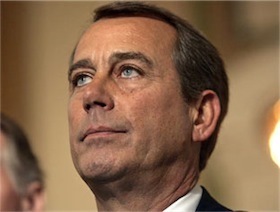
I think it's pretty clear that we're looking toward a scenario in which John Boehner shuts the government down in the near future. There'll be a lot of moves between now and then and a lot of reporting on the details, but I think the basic dynamic is pretty clear and abstract. You can compromise about numbers—$10 billion or $5 billion. And you can compromise across modes—cut that instead of this. But you can't compromise between Congressional Republicans desire to force the White House into a humiliating defeat and the White House's desire to not be humiliated and defeated. A compromise acceptable to the President would, by definition, fail to meet the objective of halting the march toward socialism.
The interesting theoretical question, I think, is why did the 2006 midterms not result in a government shutdown the way the 1994 midterms did and the 2010 ones will. Part of the issue may have been priority mismatch. Congressional Democrats cared most about seizing the opportunity to increase spending on some core domestic initiatives, while the Bush administration cared most about maintaining a free hand to conduct the war in Iraq. There was intense anger at Democrats from the base for not doing more to force the issue on Iraq in 2007, but it wasn't anger that had any basis in organized interest groups with real leverage.
The fact that a president (with his nationwide constituency) and a House Speaker flush with midterm victory (having won most recently) both have plausible claims to popular legitimacy makes these kind of clashes difficult to resolve. If Obama were the King of England, then what would happen is that over time his legitimacy would erode and power would pass to the Speaker.


Galston & Kamarck on Moderates
Why don't Democratic Party politicians say and do more liberal stuff? The answer is clearly explained in a new paper from William Galston and Elaine Kamarck on "The Still-Vital Center: Moderates, Democrats, and the Renewal of American Politics". They show that Democratic Party politicians can win if and only if they secure large majorities of the vote from self-identified moderates, and then self-identified moderates have different opinions from liberals about several important issues. I really strongly recommend the paper as a dose of Real Talk for folks (myself included) who are more inclined to take the liberal side of these issues:
50% of moderates, versus 29% of liberals, believe that the federal government has too much power. 52% of moderates, versus only 32% of liberals, say that "government is trying to do too many things that should be left to individuals and businesses." [...] 61% of moderates think that labor unions have too much power, compared to 48% of liberals. [...] Moderates are more likely than are those to their left to think that poor people have become too dependent on the government, that too many people want to get ahead without working hard and making sacrifices, and that we have already made the changes needed to give African-Americans equal rights. Only 37% of moderates, but fully 59% of liberals, believe that the federal government is responsible for reducing income differences between rich and poor.
Much less persuasive are their prescriptions. Galston and Kamarck say that political institutions should be altered so as to increase the voice of moderates in the process. They offer three proposals for this, open primaries, redistricting reform, and super-majority selection of congressional leadership.
Now they concede that ("Brookings' Thomas Mann cautions that there is little data to support a link between independent redistricting and changes in Congress") there's actually no reason to think the redistricting process has anything to do with what's troubling them, so I'm not sure what this idea is doing there. Requiring a super-majority to elect the Speaker of the House seems like it would just render the Speakership a meaningless office. Real leadership power would rest with some kind of shadow caucus leaders who actually spoke for their members. This leaves us with open primaries, where again I wonder what the evidence is. Do open states like South Carolina and Vermont really give us moderate legislators? As they argue in some detail, the striking thing about American primaries is that nobody votes in them. They way to give moderates more voice in the political process, it seems to me, would be to organize them and get them more engaged with the process.
Last, I'd say the most salient feature of the American political system is its large status quo bias. Legislation almost always requires bipartisan support to become a law. You can think this is a good feature of the system or a bad one, but it's certainly a feature. Under the circumstances, Jamelle Bouie is right to that moderates somehow lack voice. Party line legislating is extremely rare. In the past 20 years, I can only think of two significant bills—the 1993 Clinton budget and the Affordable Care Act—that passed without some measure of bipartisanship. This is why I think it's difficult to come up with persuasive ideas for solving the "problem," it's a problem that doesn't really seem to exist.


Something's Got to Go Up
I think there's a lot of waste in our health care sector. That said, I think discussion of health care costs sometimes ignore the fact that something has to go up as a share of GDP. Consider that food as a share of income is shrinking:
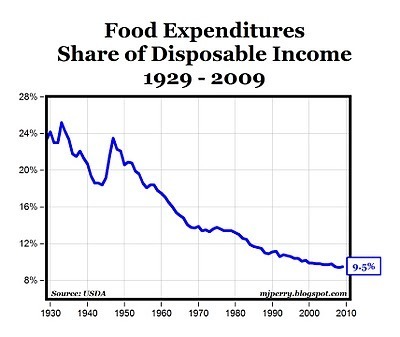
And clothing is getting cheaper too:
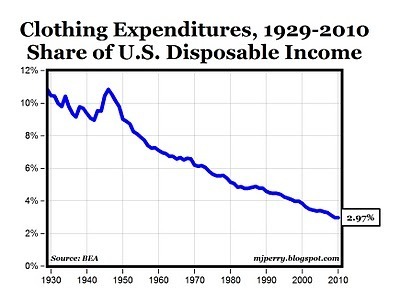
Americans are getting richer, agriculture is becoming more efficient, apparel is increasingly made by Bangladeshis or robots, etc. At the same time, computers and other electronic gadgets are getting cheaper in real terms. And if some things shrink as a share of our income, other things need to grow. The biggest of those things has been health care. And that makes perfect sense. Richer people should be spending our money trying to be healthier. The problem we have isn't so much that the volume of health related spending is "too high" as it is that we're actually purchasing shockingly little in the way of improved health for all that money.


February 23, 2011
Endgame
I knew it was something:
— Republicans like NCIS, Democrats rightly prefer CSI: Miami.
— Tennessee legislature wants to "teach the controversy".
— I think Glenn Beck's comparison of Reform Judaism and radical Islam manages to be unfair to both.
— Twitter as asymmetrical labor market shock.
— This Steven Pearlstein column is trippy, but seems about right to me.
Rancid, "Solidarity".


Restaurant Fact of the Day

(cc photo by twicepix)
Engines of upward opportunity for woman and minorities:
As millions of Americans dine out this Valentine's Day, new research from the National Restaurant Association shows that nearly 50 percent of restaurants are now owned by women. The research also shows that restaurants employ more minority managers than any other industry, and that Hispanic restaurant ownership has increased 42 percent in the past five years.
Once again, in my view these people are "making things."


Cheap Gasoline
Ryan Avent offers a chart of "petrol" prices in the developed world:
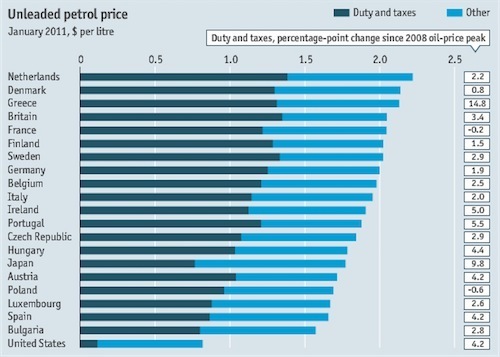
At a time when the economy needs more stimulus, I would not favor increasing the gas tax. But a time will come when deficit reduction is important, and reducing the deficit through higher gasoline taxes is a very economically solid policy. In the real world, the press has decided that 2011 would be a good year for a giant deficit freakout, and it's insane that higher gas taxes aren't on the policy agenda as an option.


Strong Public Support For Clean Air Act Regulation of Greenhouse Gasses
Most policy wonks are inclined to think that carbon pricing is a much better idea than regulating greenhouse gasses under the existing Clean Air Act framework. This has led most media coverage of EPA action to lose sight of the fact that the voting public is enthusiastic about the Clean Air Act and basically all kinds of anti-pollution efforts:
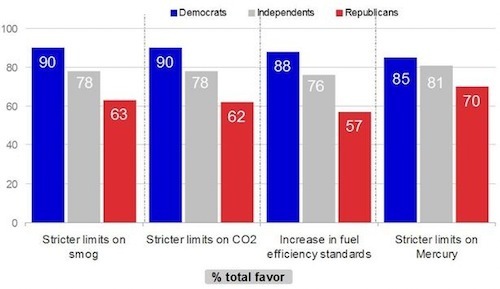
The public's strong preference for regulatory solutions that hide costs rather than make them explicit is regrettable. But it is what it is, and if this is the only politically viable way to regulate air pollution than that's where we are. The Obama administration needs to stay firm, and the business community and its allies in the conservative movement need to start getting real and come back to the table for negotiations about better ways of promoting clean energy.


The Weak German Recovery

(my photo, available under cc license)
David Leonhardt offers an update:
Well, it turns out the German boom didn't last long. With its modest stimulus winding down, Germany's growth slowed sharply late last year, and its economic output still has not recovered to its prerecession peak. Output in the United States — where the stimulus program has been bigger and longer lasting — has recovered. This country would now need to suffer through a double-dip recession for its gross domestic product to be in the same condition as Germany's.
Yet many members of Congress continue to insist that budget cuts are the path to prosperity. The only question in Washington seems to be how deeply to cut federal spending this year.
Strange times. What's true is that Germany's stimulus did a better job of specifically targeting employment.


Access

I think Ezra Klein has the right take on the prank call where Ian Murphy rung up Scott Walker while pretending to be David Koch:
But if the transcript of the conversation is unexceptional, the fact of it is lethal. The state's Democratic senators can't get Walker on the phone, but someone can call the governor's front desk, identify themselves as David Koch, and then speak with both the governor and his chief of staff? That's where you see the access and power that major corporations and wealthy contributors will have in a Walker administration, and why so many in Wisconsin are reluctant to see the only major interest group representing workers taken out of the game.
I think it would be interesting to imagine a world in which David Koch stood no better chance of talking to the Governor of Wisconsin than did any other private citizen who's not a resident of a state. Imagine a world in which every single one of Scott Walker's constituents had more access to Scott Walker than does a rich out of state donor. And imagine the richest man in Wisconsin had equal access to Walker as the poorest. Try to imagine it. I think that if we lived in that world, people would have a very different reaction to complaints about the disproportionate political influence of labor unions.


Matthew Yglesias's Blog
- Matthew Yglesias's profile
- 72 followers



